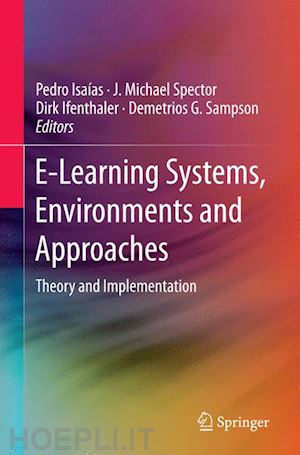Pedro Isaías is an associate professor at Universidade Aberta (Portuguese Open University) in Lisbon, Portugal, responsible for several courses and director of the master degree program in Electronic Commerce and Internet since its start in 2003. He is co-founder and president of IADIS – International Association for Development of the Information Society, a scientific non-profit association. He holds a PhD in Information Management (in the speciality of information and decision systems) from the New University of Lisbon. Author of several books (both as author/co-author and editor/co-editor), journal and conference papers and research reports, all in the information systems area, he has headed several conferences and workshops within the mentioned area. He has also been responsible for the scientific coordination of several EU funded research projects. J. Michael Spector is Chair of Learning Technologies in the College of Information at the University of North Texas. His recent research is in the areas of intelligent support for instructional design, system dynamics based learning environments, assessing learning in complex domains, distance learning and technology integration in education. Dr. Spector served on the International Board of Standards for Training, Performance and Instruction (IBSTPI) as Executive Vice President; he is on the Executive Committee of the IEEE Learning Technology Technical Committee and is Past-President of the Association for Educational and Communications Technology (AECT). He is the editor of the Development Section of Educational Technology Research & Development, and he serves on numerous other editorial boards. He co-edited the third and fourth editions of the Handbook of Research on Educational Communications and Technology, and has more than 100 journal articles, book chapters and books to his credit. Dirk Ifenthaler is the Director, Centre for Research in Digital Learning at Deakin University. His previous rolesinclude Manager of Applied Research and Learning Analytics at Open Universities Australia, Affiliate Research Scholar at the University of Oklahoma, USA, and Interim Department Chair and Professor for Educational Science at the University of Mannheim, Germany. Professor Ifenthaler was a 2012 Fulbright Scholar-in-Residence at the Jeannine Rainbolt College of Education, the University of Oklahoma, USA. Dirk's background is in cognitive psychology, educational technology, statistics, and teacher education. He developed automated and computer-based methodologies for the assessment, analysis and feedback of graphical and natural language representations. His research outcomes include numerous co-authored books, book series, book chapters, journal articles and international conference papers. Dirk is the Editor-in-Chief of Technology, Knowledge and Learning and a member of the Editorial Board for Educational Technology Research and Development. He is the 2013-2014 President for the AECT (Association for Educational Communications and Technology) Division Design and Development, 2013-2014 Chair for the AERA (American Educational Research Association) Special Interest Group Technology, Instruction, Cognition and Learning and Co-Program Chair for the international conference on Cognition and Exploratory Learning in the Digital Age (CELDA). Dirk received the 2012 Outstanding Journal Article Award by AECT, 2009 Outstanding Reviewer Award for Educational Technology Research and Development and the 2006 Outstanding Dissertation Award by the University of Freiburg, Germany. Demetrios G. Sampson has received a Diploma in Electrical Engineering from the Democritus University of Thrace, Greece in 1989 and a Ph.D. in Electronic Systems Engineering from the University of Essex, UK in 1995. He is a Professor of Digital Systems for Learning and Education at the Department of Digital Systems, University of Piraeus, Greece and a Research Fellow at the Information Technologies Institute (ITI), Centre of Research and Technology Hellas (CERTH). He is the Founder and Director of the Advanced Digital Systems and Services for Education and Learning (ASK) since 1999. His main scientific interests are in the area of Learning Technologies. He is the co-author of more than 310 publications in scientific books, journals and conferences with at least 1370 known citations (h-index: 20). He has received 6 times Best Paper Award in International Conferences on Advanced Learning Technologies. He is a Senior and Golden Core Member of IEEE and he was the elected Chair of the IEEE Computer Society Technical Committee on Learning Technologies (2008-2011). He is Co-Editor-in-Chief of the Educational Technology and Society Journal (impact factor 1.171, 2012). He is also a Member of the Steering Committee of the IEEE Transactions on Learning Technologies, Member of the Advisory Board of the Journal of King Saud University - Computer and Information Sciences, Member of the Editorial Board of 20 Internatio











